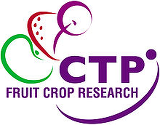REFERENCE: CTP_FCR_2021_4
Supervisors: Dr Helen Cockerton, Ms Felicidad Fernández (NIAB EMR); Zoe Wilson (University of Nottingham)
This student will be registered with the University of Nottingham. Beginning in October 2021, the successful candidate should have (or expect to have) an Honours Degree (or equivalent) with a minimum of 2.1 in Plant Science, Biology, Genetics, or other related science subjects.
Background
Raspberries (Rubus idaeus) are a high value horticultural crop with an expanding consumer market and there is great interest in the development of new raspberry varieties with improved fruit quality and desirable agronomic traits. Raspberry is a diploid with a very small genome size (275 Mb) making it an easy and tractable system to work with. However, to date, a high-quality genome assembly has not been published and there are limited high-throughput resources available to assist molecular breeding, hindering the uptake of new technologies for small and medium-size programmes.
Objectives and approaches
We propose to develop these resources whilst expanding current knowledge on the variability and heritability of fruit quality traits using the East Malling Rubus Breeding consortium based at NIAB EMR as a representative example of germplasm for both primocane and floricane breeding. We hope to expand upon conventional breeding strategies and determine where marker-assisted and genomic selection can be used as cost-effective strategies to enhance raspberry breeding.
WP 1 Raspberry genome sequencing, identification of SNPs & genotyping
- Re-sequencing of eight to ten key raspberry cultivars representative of the widely diverse heritage and phenotype used in the breeding programme.
- Alignment of re-sequenced cultivars to the reference genome to identify single nucleotide polymorphisms for downstream use in SNP array development.
- SNP genotyping of a pre-existing breeding populations segregating for multiple traits using a multispecies SNP chip
WP2 Phenotyping of fruit quality traits
- Definition of variability in fruit quality traits in (i) parental raspberry cultivars and (ii) segregating populations.
- Phenotyping of organoleptic traits including subjective scores of eating quality, firmness, appearance, and skin strength as well as objective measurements, namely: berry weight, titratable acidity, total soluble sugars and firmness.
- Calculation of heritability scores to dissect genetic and environmental components of traits and inform the potential to increase trait genetic gain.
- Determination of segregation ratios to identify whether traits are controlled by major dominant alleles.
WP3 Financial analysis of possible strategies for implementation of molecular technology in commercial breeding
- Survey to collate and prioritise grower, retailer and consumer preferences on fruit quality and agronomic traits in raspberry.
- Assessing which traits can be best improved with the implementation of molecular breeding strategies in raspberry breeding.
Conduct a cost-benefit analysis comparing a range of breeding strategies to determine the economic feasibility of using genomic selection and/or other marker-assisted breeding approaches to enhance desirable traits in commercial raspberry breeding.
Training
The successful candidate will gain a wide range of experience in plant genetics, breeding, genomics, and statistical data analysis.
Application
Anyone interested should fill the online application form before the deadline of 8th February 2021. If need further help or clarification, please contact recruitmentctp@emr.ac.uk.
Contact Felicidad Fernandez for an informal discussion on research contents.
